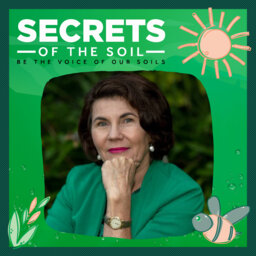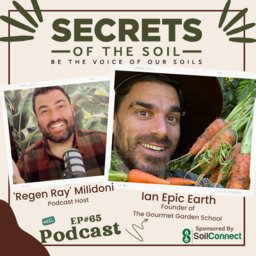🌱🎙️ New episode alert! Dive into the latest episode of “Secrets of the Soil” where ‘Regen Ray’ Milidoni sits down with Lorraine Gordon, a 4th generation farmer and director of strategic projects at Southern Cross University, to explore the transformative power of regenerative agriculture. 🌍✨
In Episode 22, “Farming Together: The Power of Change Comes From People Working Towards a Common Goal and Vision,” we unravel the secrets behind sustainable farming practices and the importance of soil health.
🎧 Tune in to learn more about:
– Integrating animals into farming for enhanced biodiversity and environmental benefits.
– The importance of waiting 3 to 5 years before selling sequestered carbon and the potential profitability for farmers.
– The necessity of a mindset shift in education to embrace holistic thinking and regenerative practices.
🔑 Key Takeaways:
– Biodiversity through Integration: Implementing animals into farming practices can significantly improve soil health and foster a richer ecosystem.
– Smart Carbon Farming: Success in carbon farming requires a patient approach, thorough homework, and choosing partners wisely.
– Continuous Learning Over Certification:Lorraine Gordon emphasizes the value of verification and continuous improvement over rigid certification for truly sustainable and regenerative agriculture.
Don’t miss this insightful conversation that sheds light on how we can all contribute to a regenerative future. 🌾🛠️
Who is Lorraine Gordon?
Lorraine Gordon is a beef producer from Ebor in NSW. She has had an extensive career in agricultural leadership. She is a former NSW Rural Woman of the Year and CEO of Regional Development Australia (RDA) Mid North Coast.
The co-initiator of the successful Ebor Beef Co-operative, she has presided on the Small Business Review Panel of the Reserve Bank of Australia, the Board of Studies at the University of New England, Charles Sturt University’s Consultative Committee, and three regional tourism boards (New England North West, South Coast, Mid North Coast). Previous positions have included Business Finance Manager and Regional Agribusiness Manager with Westpac Bank, Director of the Graduate Network of the Australian Rural Leadership Foundation, and Executive Director of Economic Security for Women. She is also a graduate of the Australian Rural Leadership Program and was an award winner in the 2002 Telstra Business Women’s Award.
Her qualifications include advanced diplomas in corporate governance, tourism, and agriculture, and an MBA from UNE majoring in project management. Lorraine is currently completing her Ph.D. in ecological economics (grazing systems in northern NSW) through UNE. Lorraine was awarded the 2018 Rural Community Leader of the Year for Australia and was a 2019 finalist for Australian of the Year for her work with farmers.

In Episode 22 of “Secrets of the Soil,” ‘Regen Ray’ Milidoni sits down with Lorraine Gordon, a visionary in the realm of regenerative agriculture and a fourth-generation farmer, to delve into the principles, practices, and potential of regenerative agriculture. This episode underscores the importance of collaborative efforts in farming and the transformative power that lies in the holistic management of our environment.
The Role of Animals in Regenerative Agriculture
Lorraine Gordon starts the discussion by illuminating the crucial role of integrating animals into farming practices. Contrary to the misconceptions surrounding beef production, Lorraine draws a sharp distinction between grass-fed and feedlot animals. Grass-fed animals, when managed correctly, significantly contribute to biodiversity and soil health. This is a far cry from feedlot practices which often lead to detrimental environmental impacts.
“We need to reframe the narrative around animals in agriculture,” Lorraine asserts. “Managed properly, animals can be a valuable tool for soil regeneration.”
Understanding Carbon Farming
As a proponent of carbon farming, Lorraine passionately describes how farmers can use cattle trading to sequester carbon. Navigating the complex world of carbon credits, she emphasizes the importance of understanding the nuances and potential profitability of this practice. She advises farmers to undertake thorough research and avoid precipitous decisions that might lead to suboptimal outcomes.
“The key to carbon farming is patience and preparation,” explains Lorraine. “It’s about making informed choices and understanding the science behind it.”
The Impact of Monocultures and Chemical Applications
Taking on a role as the voice of the soils, Lorraine sheds light on the adverse effects of monocultures and chemical applications on soil health. She points out that these practices strip the soil of its natural vitality and lead to long-term ecological damage. Lorraine advocates for a more diverse agricultural approach, which includes rotating crops and reducing chemical use.
“Healthy soil is the foundation of sustainable agriculture,” she insists. “We need to shift from short-term yield goals to long-term soil health.”
The Importance of Biodiversity
Lorraine’s passion for biodiversity is palpable throughout the conversation. The COVID-19 pandemic has made people more aware of the complexities and challenges of food production. Lorraine emphasizes that biodiversity is not just an ecological necessity but a critical factor in resilient farming systems.
“Biodiversity ensures that our farming systems are resilient against pests, diseases, and changing climate conditions,” she says.
Collaborative Business Models
One of Lorraine’s notable contributions is her involvement in the Farming Together program, which supports collaborative business models and drives the Regenerative Agriculture Alliance. She explains how bringing together diverse perspectives—from farmers to academics—can lead to powerful, innovative solutions.
“Diversity in perspectives is crucial for addressing complex challenges in landscape management,” she notes. “When we work together, we can achieve remarkable results.”
Rethinking Certification in Regenerative Agriculture
A significant highlight of the episode is Lorraine’s critique of the certification processes in regenerative agriculture. She argues against the necessity of certification, which she believes can create divisiveness rather than unity. Instead, Lorraine advocates for continuous improvement and verification systems that reflect an ongoing commitment to regenerative practices.
“Certification is a snapshot in time, but regeneration is a continuous journey,” she elaborates. “We need verification systems that encourage and acknowledge ongoing efforts.”
The Broader Implications of Regenerative Practices
The conversation expands beyond agriculture, touching on the potential of regenerative practices in urban design and healthcare. Lorraine and ‘Regen Ray’ highlight the dynamic nature of regenerative agriculture and how its principles can be applied to various sectors for broader environmental and societal benefits.
“Regenerative practices can transform how we design our cities and think about health,” says Lorraine. “It’s about restoring balance and working with nature.”
The Future of Regenerative Agriculture
As the episode draws to a close, Lorraine and ‘Regen Ray’ emphasize the need for a mindset shift towards holistic education and ecological understanding. Lorraine believes that universities must move beyond reductionist science and embrace holistic thinking to address evolving climate challenges.
“Education is the linchpin for driving the regenerative agriculture movement,” she asserts. “We need to cultivate a generation of thinkers who can see the whole picture.”
Lorraine Gordon’s insights offer a compelling vision for the future of farming—one that is rooted in collaboration, innovation, and a deep respect for the natural world. As ‘Regen Ray’ encourages soil lovers to get their hands dirty and keep exploring, it becomes clear that the power to enact change lies in our collective effort to nurture and protect the soil beneath our feet.
For those intrigued by the regenerative agriculture movement, resources and programs at Southern Cross University provide a valuable starting point. As we unlock the secrets of the soil, it is imperative to remember Lorraine’s closing words: “Look after the soil; it’s all we’ve got.”
Explore more about regenerative agriculture and get involved by visiting [Southern Cross University](https://www.scu.edu.au) and tune in to “Secrets of the Soil” for more fascinating discussions.






